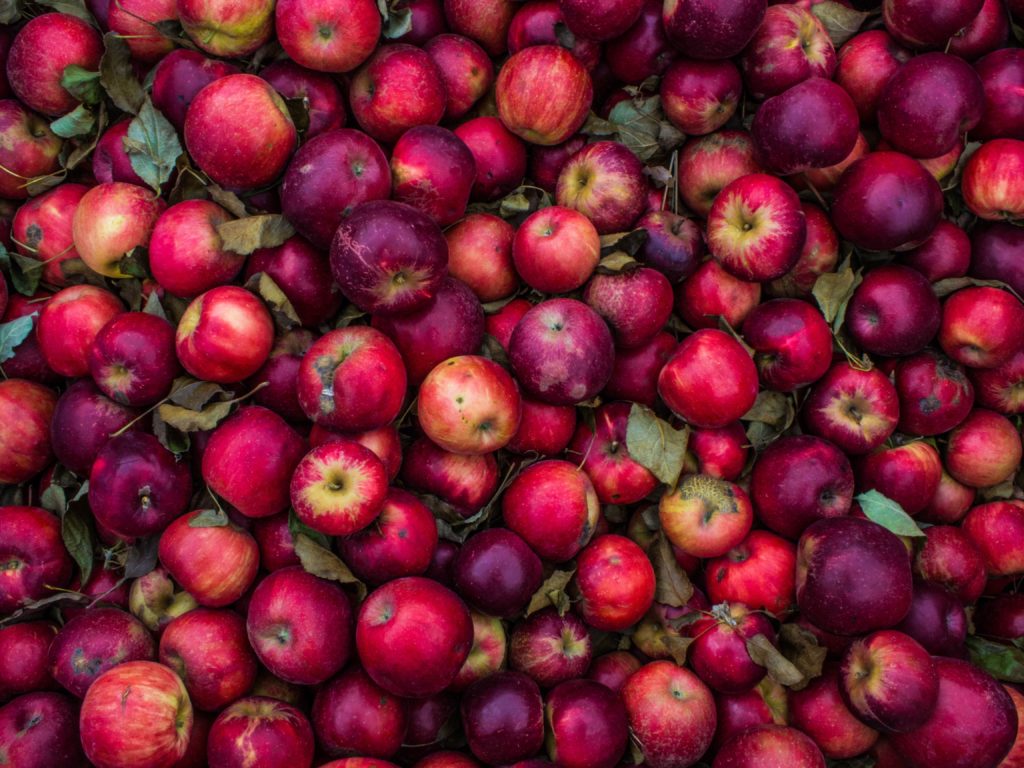It’s apple season!
Did you know the fourth most consumed fruit in the U.S are apples? They fall just behind bananas at number one, strawberries at two, and grapes in third place. Apples generate $3.2 billion dollars a year in the U.S. Over 350,000 acres in the U.S. are dedicated to growing this popular fruit. Apples can be grown in all 50 states, but they’re only grown commercially in 36 states. The top producing states are Washington, New York, Michigan, Pennsylvania, California, and Virginia but over 60 percent of apples are currently grown in Washington.
When it comes to organic orchards, they currently only account for only 6 percent of apple acreage, even though organic apples are one of the most popular organic fruits in the U.S. The top ten varieties produced in the United States are Gala, Red Delicious, Granny Smith, Fuji, Golden Delicious, Honeycrisp, Macintosh, Rome, Cripps Pink, and Empire.
Apples are a Healthy Snack
Apples make the perfect snack for fall because during cold and flu season we need the nutrients found in apples to support a healthy immune system. Most varieties are also a good source of fiber, vitamin C, and potassium, antioxidants, and phytochemicals — such as quercetin, catechin, and chlorogenic acid.
Since most of our immune system resides in our gut, it’s important to consider that apples contain a good mixture of soluble and insoluble fibers. Soluble fiber helps feed good gut bacteria and lower high cholesterol. While insoluble fiber helps keep your intestines clean and healthy.
There’s controversy over the sweetness of apples but they rank low on the glycemic index and their high fiber and polyphenol content prevent the dreaded glucose spikes.
One medium (3-inch diameter) apple offers the following nutritional profile:
- Calories: 95
- Protein: 0.5 grams
- Total Fat: 0.3 grams
- Total Carbohydrate: 25 grams
- Fiber: 4.5 grams
- Vitamin C: 14% of the Daily Value (DV)
- Potassium: 6% of the DV
- Vitamin K: 5% of the DV
- Vitamin B6: 4% of the DV
Apples are also more filling and help you sustain energy longer than bananas, croissants or even eggs. So, if you’re not convinced to add some more apples to your diet, be sure you read this next part about why it’s paramount to choose organic apples.
Why Choose Organic Apples
Over the past decade, scientists have begun conducting sophisticated comparisons of foods grown in organic and conventional farming systems. They’re finding that not all apples (or tomatoes, kiwis, or milk) are equal, especially when it comes to nutrient density and pesticide levels.
Scientist Charles Benbrook maintains a database of all the studies published since 1980 that compare the nutrient levels of organic and conventional foods. His analysis of food comparison studies shows that, on average, conventionally grown fruits and vegetables have 30 percent fewer antioxidants than their organically grown counterparts. Benbrook states that “consumption of organic produce will increase average daily antioxidant intake by about as much as an additional serving of most fruits and vegetables.”
While apples are the fourth most popular fruit in the U.S., they place fifth on an entirely different list that should cause any consumer to take pause. Apples are fifth on the dirty dozen list provided by the Environmental Working Group each year to demonstrate the products that have the most pesticide residue. But it’s important to realize that you cannot simply wash apple pesticides off which is what most consumers are led to believe. According to the EWG‘s analysis of USDA data, washed apples still had over 47 pesticide residues. The data showed up on 98 percent of the more than 700 washed apple samples tested.
The most used herbicides in apples are glyphosate, paraquat, and 2,4-D. Apples are commonly sprayed with Syngenta‘s Paraquat, a pesticide under scrutiny as it is linked to Parkinson’s disease. According to the USDA, in addition to the 81 percent of conventional apple orchards which spray organophosphates on apple orchards, carbamates and pyrethroids are also used nationwide. Chlorpyrifos, a chemical linked to lowered IQ and higher incidence of ADHD in children is still sprayed on apple orchards in the U.S. as of last year. Another chemical used in apple production is Glyphosate, which is the key ingredient in Monsanto’s signature herbicide Roundup. The World Health Organization and California state scientists have linked glyphosate to cancer.
When reviewing the What’s On My Food site we find that washed apples still have the following concerning pesticide residues:
| 6 | — | Known or Probable Carcinogens |
| 16 | — | Suspected Hormone Disruptors |
| 5 | — | Neurotoxins |
| 6 | — | Developmental or Reproductive Toxins |
In addition to chemicals of concern, there is a genetically engineered apple in the marketplace called the artic apple. The apple is also known as the “non-browning apple” in that when sliced and bagged does not brown. While this is not a genetically engineered food meant to withstand large amounts of pesticides it is still a concern for those looking to avoid GMOs entirely. When it comes to GMOs, even Arctic apples may have unforeseen consequences of genetic alteration and could impact human health. There are not enough long-term studies to know how these foods will affect our health and the health of our food future. Organic apples cannot be genetically engineered.
For anyone looking to add an apple a day to keep the doctor away, the message is loud and clear that organic apples are the best choice. Organic apples are higher in nutrient density and don’t contain dangerous chemicals that hurt human life, wildlife, and the environment.
The cost of an organic apple is not much more than a conventional apple, but consumers who are still buying conventional apples might be unaware of what type of food future they are investing in. According to this Forbes article, “if only a quarter of the public switched to buying and eating organic apples, more than $7 billion a year would be generated to support local organic farming. That is a substantial chunk of change to convince more farmers to take on the costly transition to organic production.”
The best way to add apples to your diet is to find a local farmer growing apples or find a farmer that ships organic apples to your area. Apples are mostly picked by hand and many farmers have pick-your-own orchards that allow you to select the perfect organic apples. Once you get apples, they keep best in cool temperatures. In fact, apples ripen up to 10 times faster at room temperature than if they are refrigerated.
So make the switch to organic apples this fall!
Is glyphosate used on Apples?









